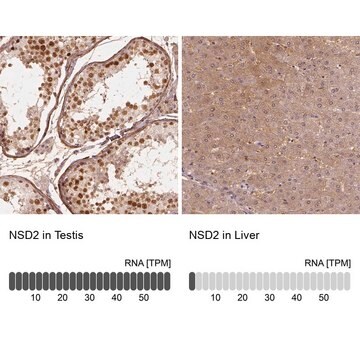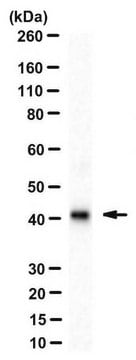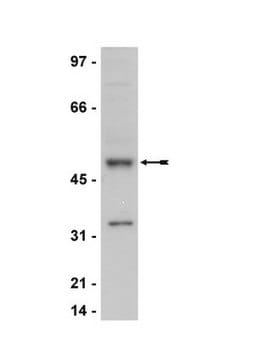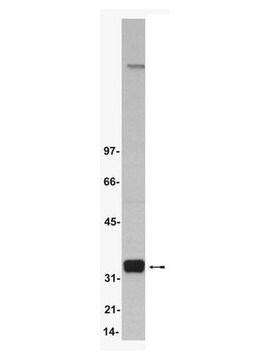ABE490
Anti-NSD2 Antibody
from rabbit, purified by affinity chromatography
Synonym(e):
Nuclear SET domain-containing protein 2, NSD2, Histone-lysine N-methyltransferase NSD2, Multiple myeloma SET domain-containing protein, MMSET, Protein trithorax-5 and Wolf-Hirschhorn syndrome candidate 1 protein, WHSC1
About This Item
Empfohlene Produkte
Biologische Quelle
rabbit
Qualitätsniveau
Antikörperform
affinity isolated antibody
Antikörper-Produkttyp
primary antibodies
Klon
polyclonal
Aufgereinigt durch
affinity chromatography
Speziesreaktivität
human
Methode(n)
immunohistochemistry: suitable
immunoprecipitation (IP): suitable
western blot: suitable
NCBI-Hinterlegungsnummer
UniProt-Hinterlegungsnummer
Versandbedingung
wet ice
Posttranslationale Modifikation Target
unmodified
Angaben zum Gen
human ... WHSC1(7468)
Allgemeine Beschreibung
Spezifität
Immunogen
Anwendung
Epigenetik & nukleäre Funktionen
Chromatin-Biologie (ChIP)
Immunohistochemistry Analysis: A 1:50 dilution from a representative lot detected NSD2 in human kidney tissues.
Immunoprecipitation Analysis: 5 µg of this antibody immunoprecipitated NSD2 from 500 µg of HCT-116 cell lysate.
Qualität
Western Blotting Analysis: 2 µg/mL of this antibody detected NSD2 in 10 µg of HeLa cell lysate.
Zielbeschreibung
Physikalische Form
Lagerung und Haltbarkeit
Sonstige Hinweise
Haftungsausschluss
Not finding the right product?
Try our Produkt-Auswahlhilfe.
Lagerklassenschlüssel
12 - Non Combustible Liquids
WGK
WGK 1
Flammpunkt (°F)
Not applicable
Flammpunkt (°C)
Not applicable
Analysenzertifikate (COA)
Suchen Sie nach Analysenzertifikate (COA), indem Sie die Lot-/Chargennummer des Produkts eingeben. Lot- und Chargennummern sind auf dem Produktetikett hinter den Wörtern ‘Lot’ oder ‘Batch’ (Lot oder Charge) zu finden.
Besitzen Sie dieses Produkt bereits?
In der Dokumentenbibliothek finden Sie die Dokumentation zu den Produkten, die Sie kürzlich erworben haben.
Unser Team von Wissenschaftlern verfügt über Erfahrung in allen Forschungsbereichen einschließlich Life Science, Materialwissenschaften, chemischer Synthese, Chromatographie, Analytik und vielen mehr..
Setzen Sie sich mit dem technischen Dienst in Verbindung.

![Pentanoic acid, 5-[[2-(2,6-dioxo-3-piperidinyl)-2,3-dihydro-1,3-dioxo-1H-isoindol-4-yl]amino]- ≥95%](/deepweb/assets/sigmaaldrich/product/structures/104/897/602a4feb-4867-4443-9433-4aa300643b4f/640/602a4feb-4867-4443-9433-4aa300643b4f.png)





